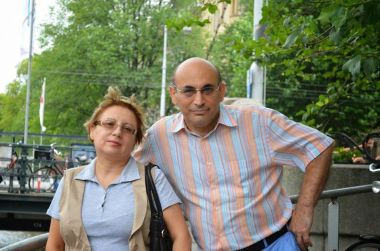Azerbaijan: Outrage at 'politically motivated' prison sentences for rights activists

Long jail sentences given to an Azerbaijani couple who fought for human rights in their country have been greeted with outrage by campaigners.
Leyla and Arif Yunus were sentenced yesterday to eight-and-a-half and seven years in prison respectively on charges of tax evasion, illegal business activity, fraud and forgery. Supporters say that the charges were concocted by prosecuters for political reasons.
They still face treason charges that could result in life imprisonment.
Leyla Yunus, 59, is one of Azerbaijan's leading human rights activists and head of the Institute for Peace and Democracy. Her husband, Arif, 60, is a historian who was an expert adviser for the group.
According to Human Rights Watch (HRW) the case against the Yunuses is part of the government's sweeping crackdown on perceived critics and independent groups. It said that over the last three years the government has harassed, intimidated and arrested dozens of human rights activists, independent journalists, political figures and bloggers.
The couple are both in poor health. One of their lawyers told HRW that in his final statement, Arif Yunus said that he had been medicated throughout the trial with strong injections and could barely understand anything, but that the court paid no heed. He said the trial had been "rushed and strenuous, more than a man as sick as he could bear". The lawyer said that when he had finished speaking, he cried out, grabbed the back of his head, where he has an undiagnosed lump, and stumbled.
In her final statement, Leyla Yunus, who has diabetes, compared the proceedings with those during the Soviet era.
During the reading of the verdict a representative from HRW was in the courtroom and said that the defendants looked frail and ill. The representative said that Arif Yunus was unable to sit up, but had to lie on a bench provided in the glass cage where defendants sit, with his head on his wife's lap. In the stifling courtroom, Leyla Yunus was fanning her husband and herself looked close to fainting.
"The fact that the verdicts against Leyla and Arif Yunus were totally predictable does not make them any less a travesty," said Rachel Denber, HRW's deputy Europe and Central Asia director. "The Yunuses never should have been arrested, let alone imprisoned and prosecuted. The Azerbaijani authorities should now do the right thing, have the convictions and sentences set aside, and turn a page on the appalling crackdown against human rights defenders, of which the Yunuses are victims."
According to Amnesty International, the trials show "the continuous criminalization of human rights defenders in Azerbaijan".
"These absurd charges have resulted in viciously harsh sentences for Azerbaijan's prominent human rights defenders Leyla and Arif Yunus. We urge the government to quash these convictions. Leyla and Arif Yunus are prisoners of conscience and they must be immediately and unconditionally released," said Amnesty International campaigner Levan Asatiani.
The UK's Minister for Europe, David Lidington, said he was "deeply troubled" by the sentence: "A number of aspects of the conduct of the trial reinforced the impression that the verdict was politically motivated. These included restrictions on diplomats and other observers accessing the court room. The apparent deterioration of Leyla and Arif's health during the past year in pre-trial detention is also particularly worrying."
He highlighted the imprisonment of other campaigners including journalist Khadija Ismayilova, human rights lawyer Intigam Aliyev, and democracy campaigner Rasul Jafarov. "Of additional concern are allegations that politician Ilgar Mammadov was subject to ill-treatment while in detention," he said.
Religious persecution is also an issue in Azerbaijan, a mainly Muslim nation – though with a secular constitution – in which Christians are a small minority. According to Open Doors, the government is tightening its grip on religious groups.
The Reporters Without Borders organisation ranks Azerbaijan 162 out of 180 countries for press freedom. The Committee to Protect Journalists ranks it as the fifth most censored country in the world.











